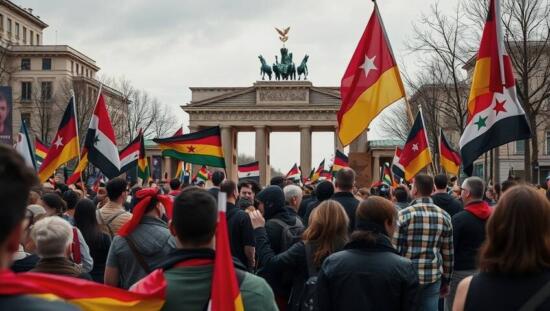After the fall of the Assad regime in Syria, many Syrians in Germany took to the streets on Sunday to celebrate the power shift.
In Berlin, spontaneous gatherings took place in Neukölln and Kreuzberg. A jubilant car procession had already driven through Berlin’s Neukölln on Saturday evening within the exiled community, with gatherings also held in several other cities.
However, politicians warn against euphoria. Nils Schmid, the foreign policy spokesperson of the SPD parliamentary group, warned against high expectations after the regime change in Syria: “Bashar al-Assad is the butcher of his own people. It’s good that he’s no longer in charge. Contrary to some misconceptions, he was never able to bring stability to the war-torn country.”
Under him, the state had “degenerated into a band of robbers and murderers”; even the supposed pillar of stability, the army, had disintegrated, Schmid said to the Welt, cautioning that there was a need to warn against over-optimistic hopes for peace and democracy, as a long phase of uncertainty and continued military confrontations over territories and sovereignty was more likely.
The international community’s top priority now should be the “restoration of a minimum state in Syria”. This could only be achieved by conducting talks with all parties, including Hayat Tahrir al-Sham, the United Nations-led political talks being the “suitable framework” for this, Schmid said. Only thus could the country’s rebuilding be successful. “Essential for this is an intra-Syrian reconciliation process, with the first civil society initiatives already in place. The release of all political prisoners and the clarification of the fates of many thousands of the disappeared are essential prerequisites for this.”
Stefan Keuter, the AfD’s parliamentary group deputy, expects great political instability following the recent developments: “The coup in Syria will further destabilize the region and trigger disruptions, the extent of which is not yet foreseeable,” he said to the Welt. Hayat Tahrir al-Sham is a core Islamic alliance to which extremist and terrorist groups had joined.
“For the many Christian communities still living in Syria, very hard times could now be on the horizon,” Keuter said, looking at Germany’s role, saying that “responsible politics” should seek to engage in conversation with every ruler, including the new rulers in Syria. “A refusal to engage like that against Afghanistan, where a German diplomatic mission has not yet been reopened, harms German interests.”
Alexander Throm, the CDU’s internal expert, warns of a new refugee wave. “Therefore, border rejections are particularly urgent now,” he said to the Funke Media Group newspapers. Throm also sees the possibility of Syrian refugees returning to their homeland.
It should be examined when voluntary returns could increase and whether the protection grounds for many Syrians no longer apply, he said. “Of course, it should remain our goal, even then, to resettle in Syria or to specific regions, to push back against the Schutzengel.





